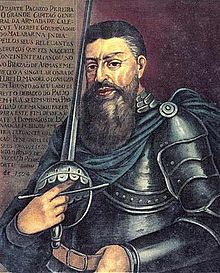Duarte Pacheco Pereira
Appearance

Duarte Pacheco Pereira (c. 1460 – 1533) was a Portuguese explorer, navigator, conquistador, and cartographer. It is possible that he was the first to discover the mainland of America, in 1498.
Quotes
[edit]- E alem do que dito he, ha experiencia, que he madre das cousas, nos desengana e de toda duuida nos tira.
- And beyond what has been said, experience, which is the mother of all things, undeceives us and removes all our doubts.
- As quoted in Robertson The Hispanic American historical review, Vol 16 (1936), p. 325
- Variant translation: Experiment is the mother of realities, removes our errors and solves our doubts [and by the same method of experiment] we are able to protect ourselves against the delusions and fables that some ancient cosmographers have left us in writing.
- As quoted in Welch Europe's discovery of South Africa (1937), p. 95
- cf. Esmeraldo de situ orbis, Book IV, ch. I, p. 152: Craramente se mostra ser falso o que escrevêram; poys debaixo da mesma equinocial há tanta habitaçam de jente, quanto teemos sabida e praticada; e como quer que a experiencia he madre das cousas, por ella soubemos rradicalmente a verdade.
- And beyond what has been said, experience, which is the mother of all things, undeceives us and removes all our doubts.
- Bemauenturado Príncipe, temos sabido e visto como no terceiro anno de vosso Reinado do hanno de nosso senhor de 1498, donde nos vossa alteza mandou descobrir a parte oucidental, passando alem ha grandeza do mar oceano, onde he achada a navegada hûa tão grande terra firme, com muitas e grandes ilhas ajacentes a ella, que se estende a setente graaos de ladeza da linha equinoçial contra ho pollo artico e posto que seja asaz fora, he grandemente pouorada, e do mesmo circulo equinocial torna outra vez e vay alem em vinte e oito graaos e meo de ladeza contra ho pollo antartico, e tanto se dilata sua grandeza e corre com muita longura, que de hûa parte nem da outra foy visto nem sabido ho fim e cabo della; pello qual segundo ha hordem que leua, he certo que vay en cercoyto por toda a Redondeza.
- Most fortunate Prince, we have known and seen how in the third year of your reign in the year of Our Lord 1498, in which your Highness ordered us to discover the Western region, a very large landmass with many large islands adjacent, extending 700 North of the Equator, and located beyond the greatness of the Ocean, has been discovered and navigated; this distant land is densely populated and extends 28º degrees on the other side of the Equator towards the Antarctic Pole. Such is its greatness and length that on either side its end has not been seen or known, so that it is certain that it goes round the whole globe.
- Esmeraldo de situ orbis [published between 1506 and 1508], Part I, ch. I, translated and edited by George Herbert Tinley Kimble, London: 1937, p. 12; Duarte Pacheco Pereira was most likely referring to the coast of Brazil.
- Variant translations:
- Your Highness sent us to discover towards the west, across the broad expansion of the ocean sea where there is found and sailed a very large mainland with many and large adjacent islands, which extends to 70°N of the equator to … 28º 50S.
- As quoted in Diffie, Davison, Winius, Foundations of the Portuguese Empire (1977), p. 451
- In the third year of your reign, in the year of grace of 1498, Your Highness ordered me that I went on a discovery expedition, in the areas of the west, crossing the entire extension of the ocean sea, where there was found and rounded a great firm land...
- As quoted in Silva Pinto Sagres (2002), p. 313
- Your Highness sent us to discover towards the west, across the broad expansion of the ocean sea where there is found and sailed a very large mainland with many and large adjacent islands, which extends to 70°N of the equator to … 28º 50S.
Quotes about Duarte Pacheco Pereira
[edit]- E canta como lá se embarcaria
Em Belém o remédio deste dano,
Sem saber o que em si ao mar traria,
O grão Pacheco, Aquiles Lusitano.
O peso sentirão, quando entraria,
O curvo lenho e o férvido Oceano,
Quando mais n' água os troncos que gemerem
Contra sua natureza se meterem.- Luís de Camões, Os Lusíadas (1572), Canto X, 12.
- Translations:
- And she sung, how there they should at length embark
In Belem, the remedy against this malice,
Without knowing who the sea would thus set to work
The great Pacheco, Lusitanian Achilles:
Sensible of more weight, when entering the bark
The crooked timbers, and the fervid billows,
Those deeper in water shall sink; and higher bound
Shall ocean waves, when they the deep ship surround.- Translated by Thomas Livingstone Mitchell, The Lusiad of Luis de Camoens, Closely Translated (1854), p. 245
- She sang how in his ship a man would go
From Belem to avenge the cruel shame.
The weight it bears the ocean shall not know,
That great Pacheco who shall justly claim
Of Portuguese Achilles' glorious name;
When he embarks, the surging waves his weight
Shall feel, and all the vessel's beams and frame
Shall groan oppressed beneath the burthen great,
And in the water sink below its usual state.- Translated by Robert Ffrench Duff, The Lusiad of Camoens translated into English Spencerian verse (1880), p. 365
- And she sung, how there they should at length embark

